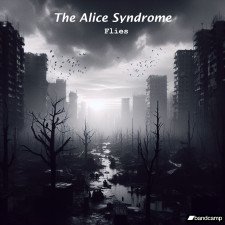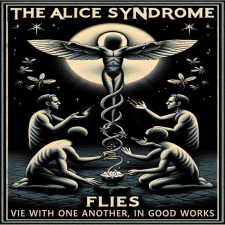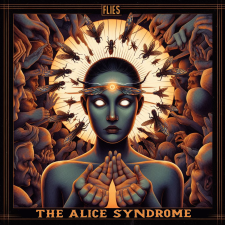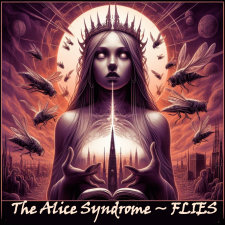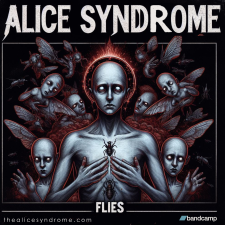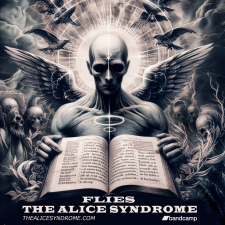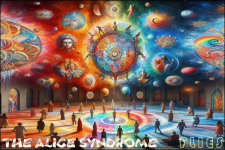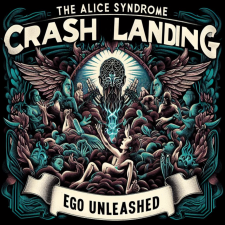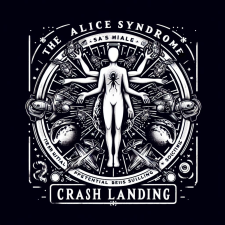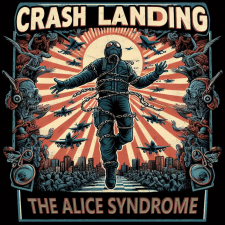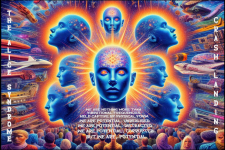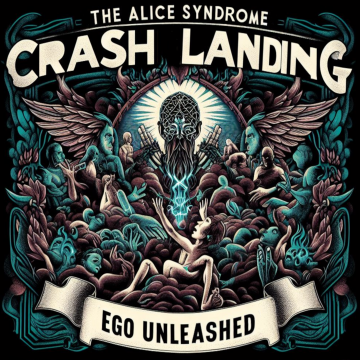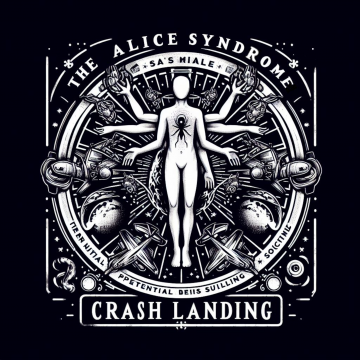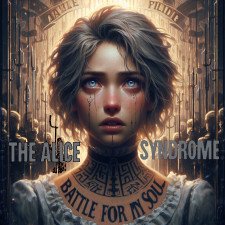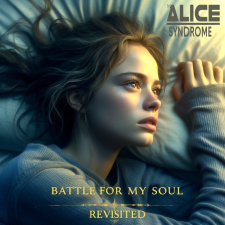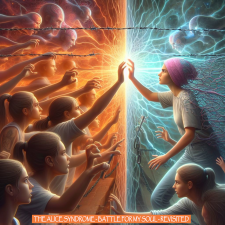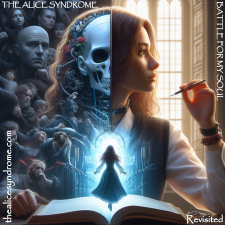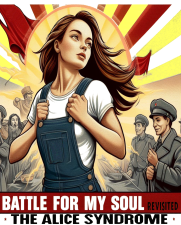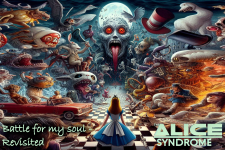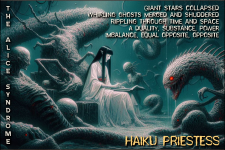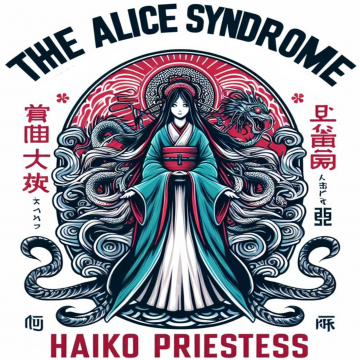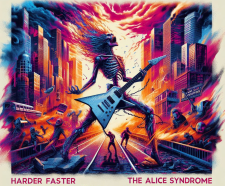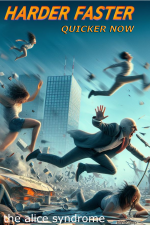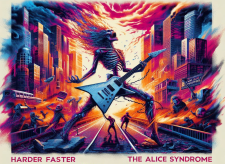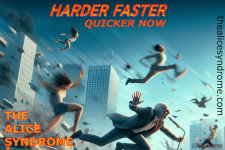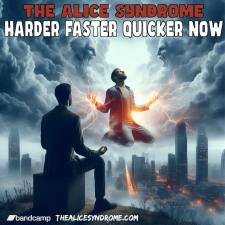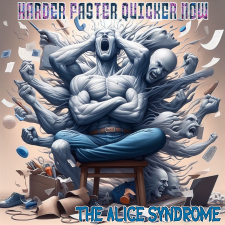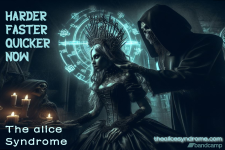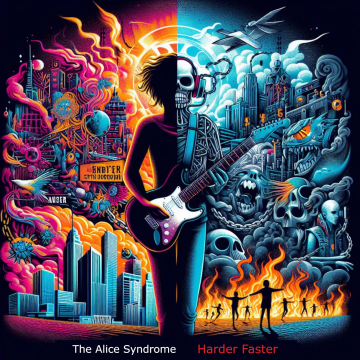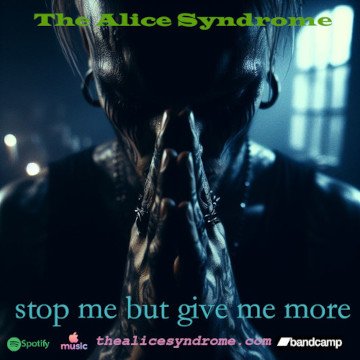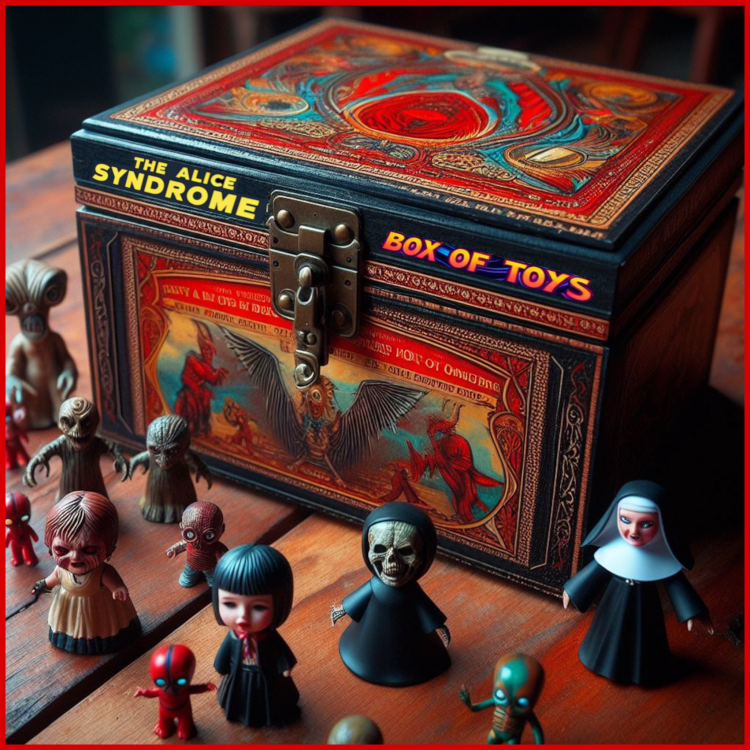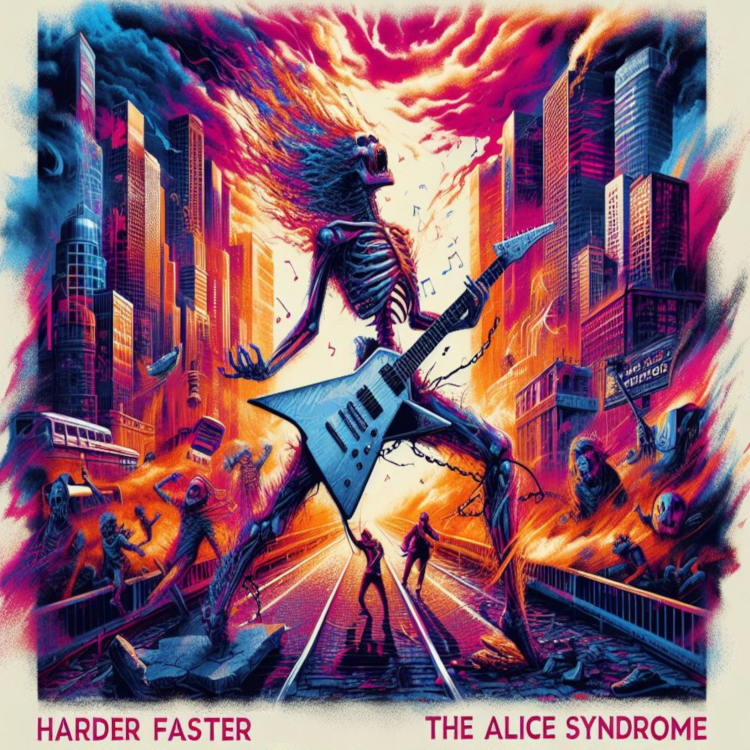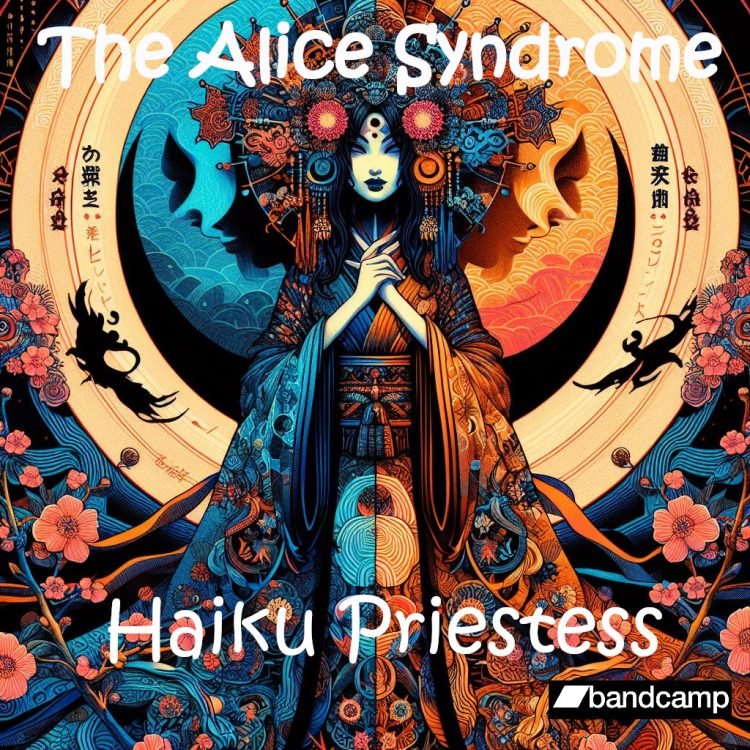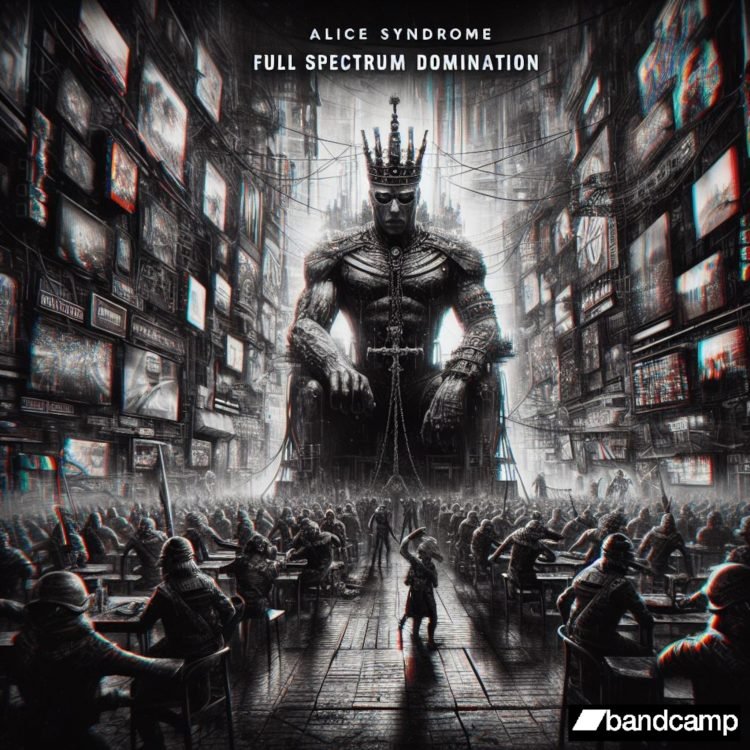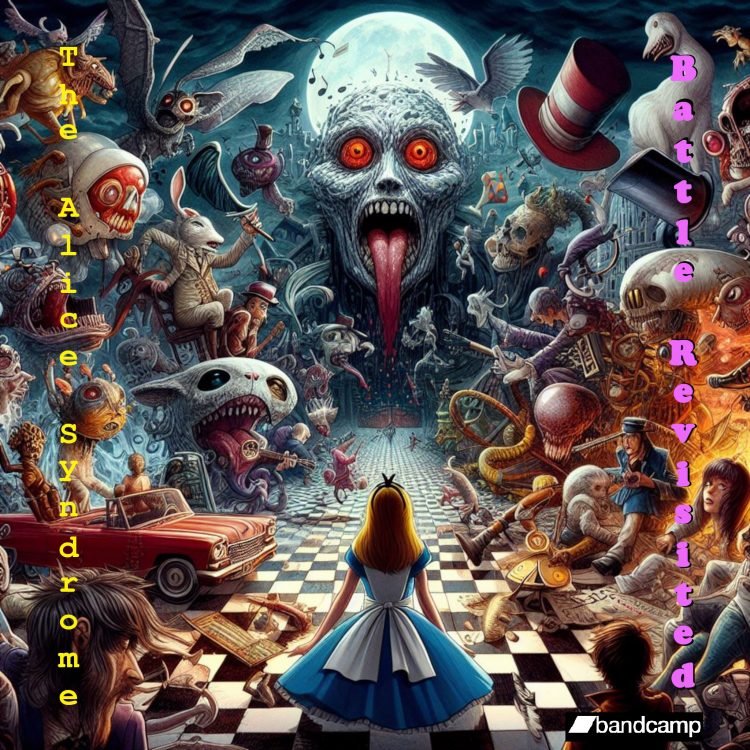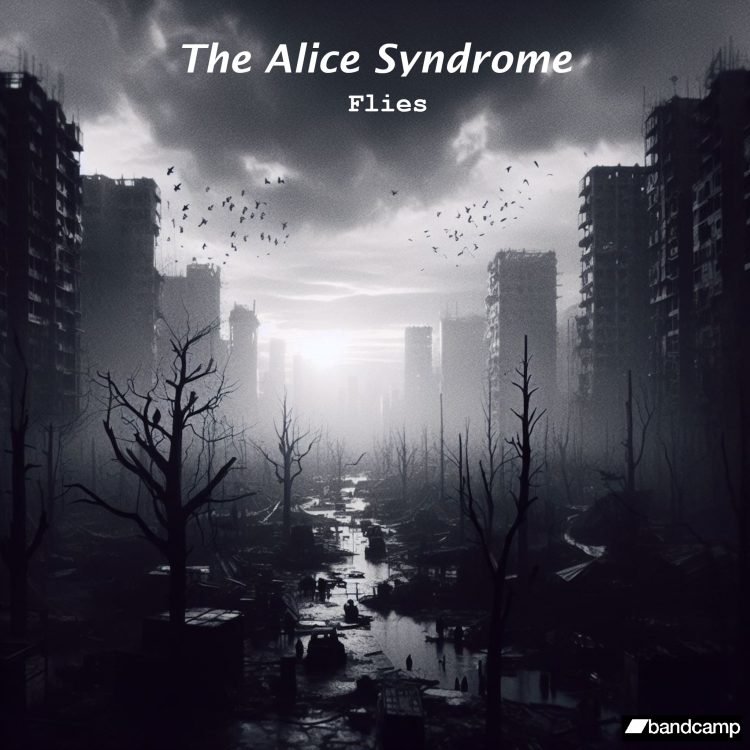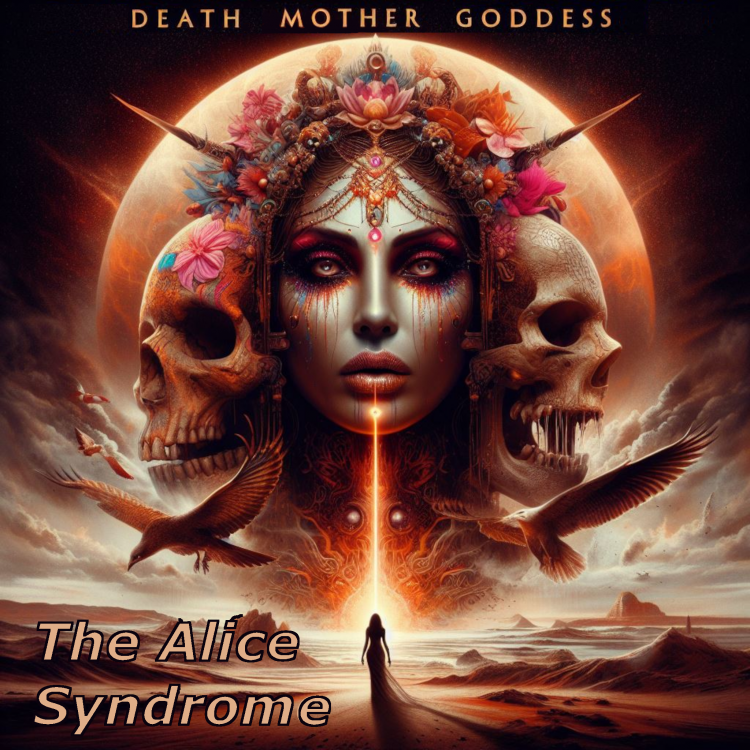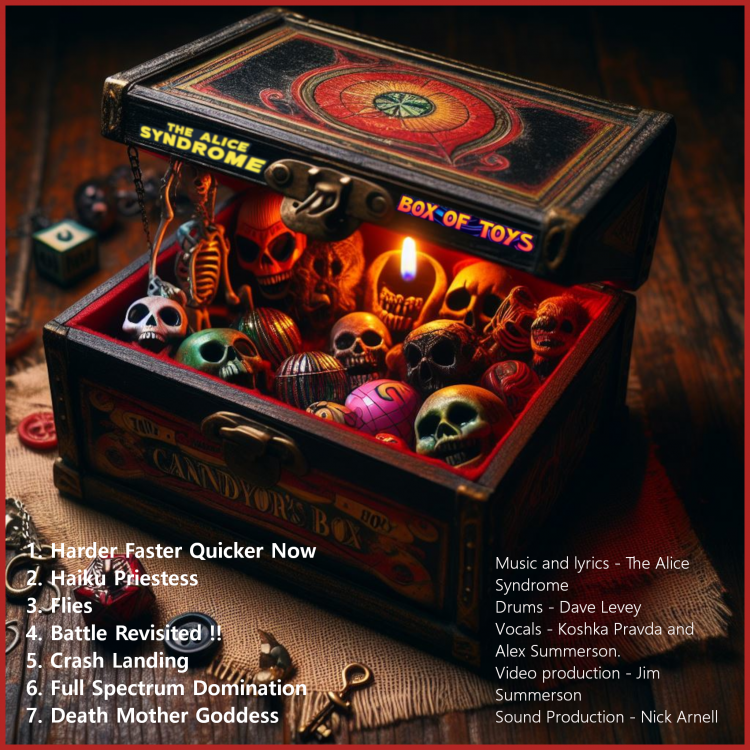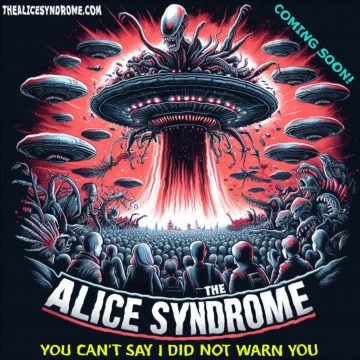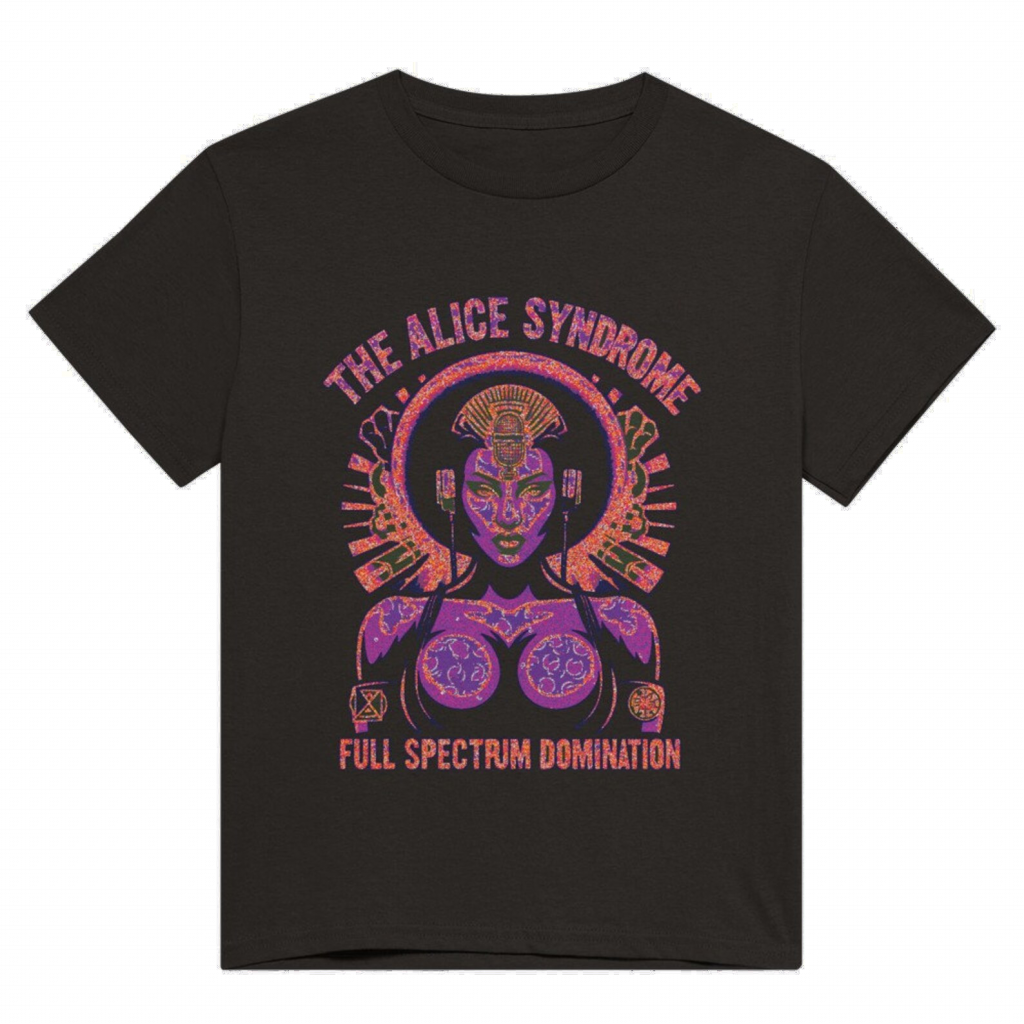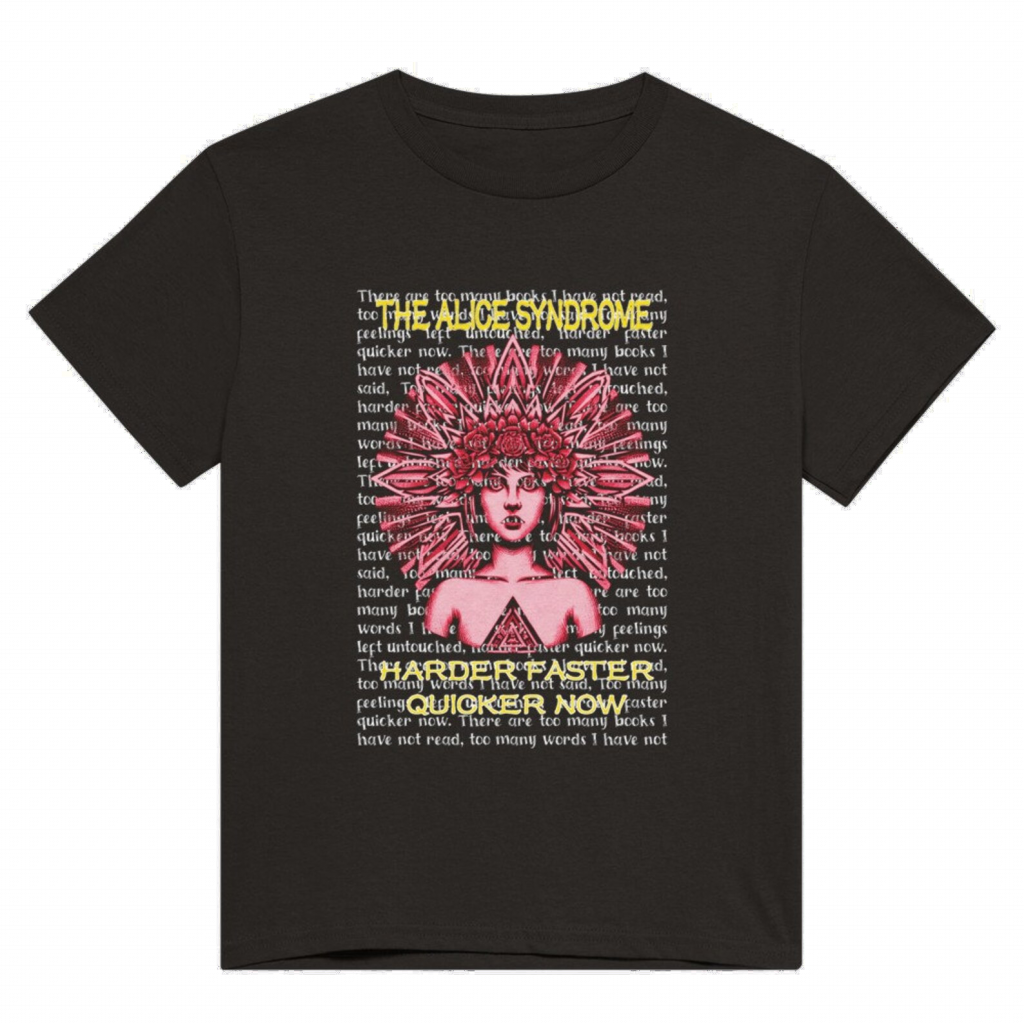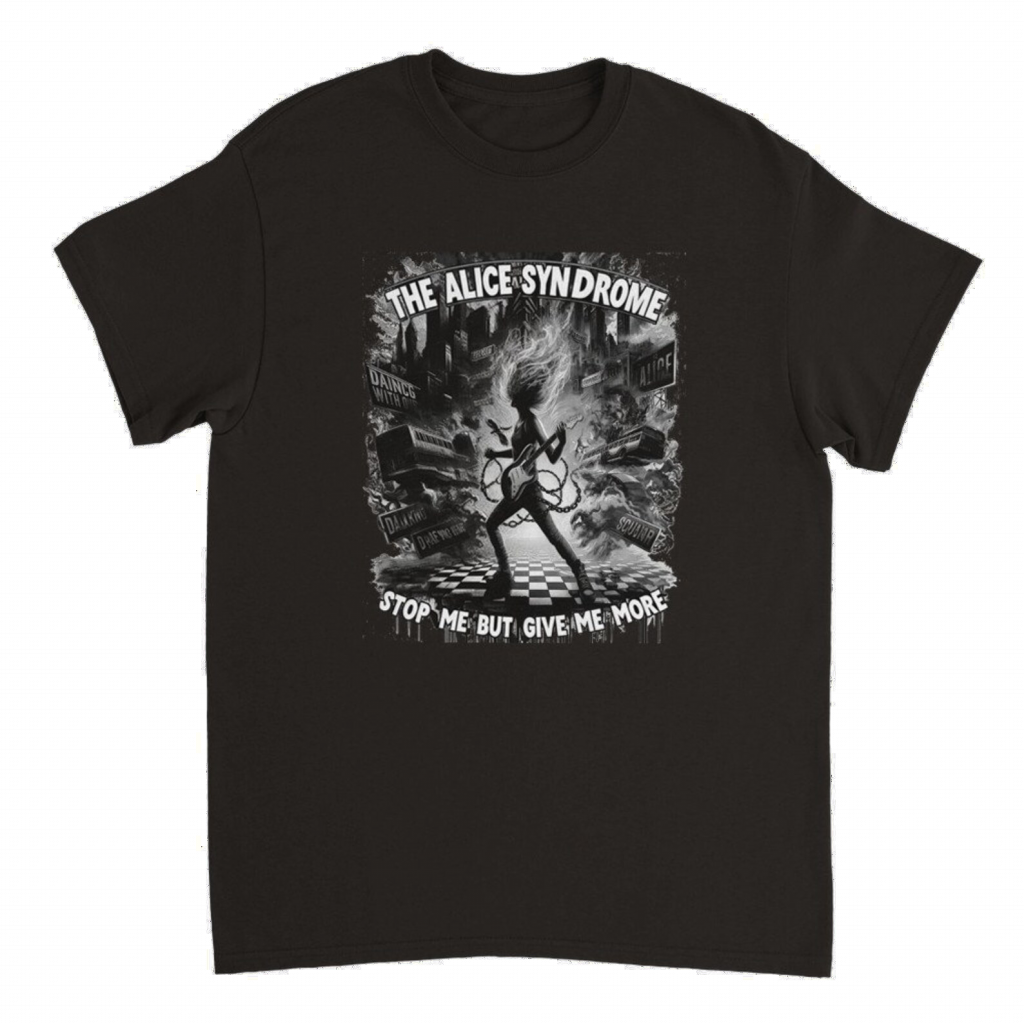This is the resources page for The Alice Syndrome’s track, Flies.
Category: Box of Toys
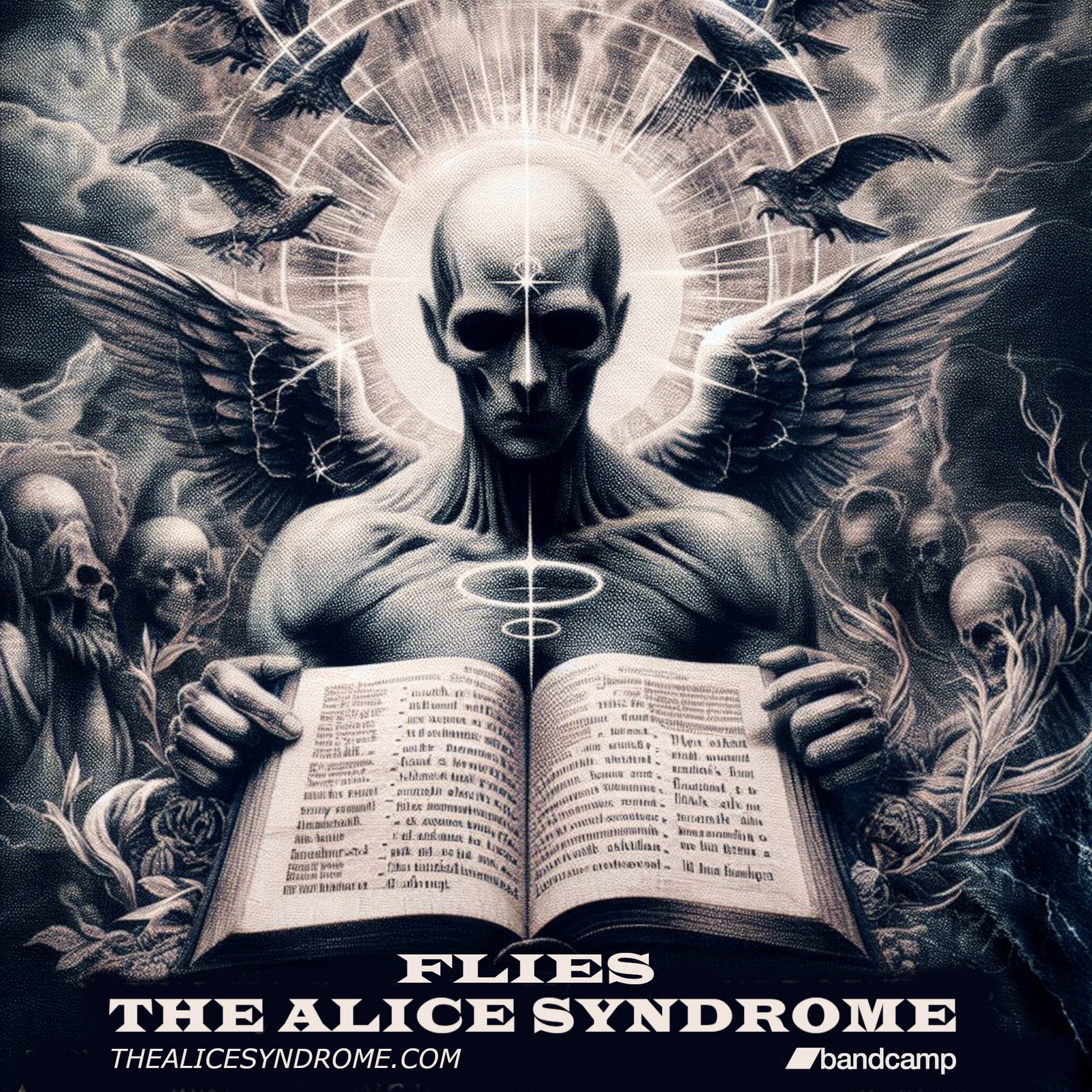
This is the resources page for The Alice Syndrome’s track, Flies.

Download Merchandise George's Blog Potential triggers
Lyrics I submit to the lord of the universe Wherever you are, death will overtake you Give glad tidings to those who patiently proceed By the token of time through the ages – Islamic break – Vie with one another, in good works Wherever you are, death will overtake you I submit to the lord of the universe Give glad tidings to those who patiently proceed Who so interveneth, in a good cause – Islamic break – Wherever you are, death will overtake you I submit to the lord of the universe I submit to the lord of the universe
Though you are in towers raised high
Vie with one another, in good works
By the token of time through the ages
Vie with one another, in good works
Verify, man is in lust
Except that which have faith
And do righteous things
And join together, in mutual teachings of truth
And of patience
And of constancy
Give glad tidings to those who patiently proceed
Though you are in towers raised high
Vie with one another, in good works
Shall have the reward thereof
And who so interveneth in an evil cause</span>
Will bear the consequences thereof
By the token of time through the ages
Though you are in towers raised high
Jan 18
Flies – Resources
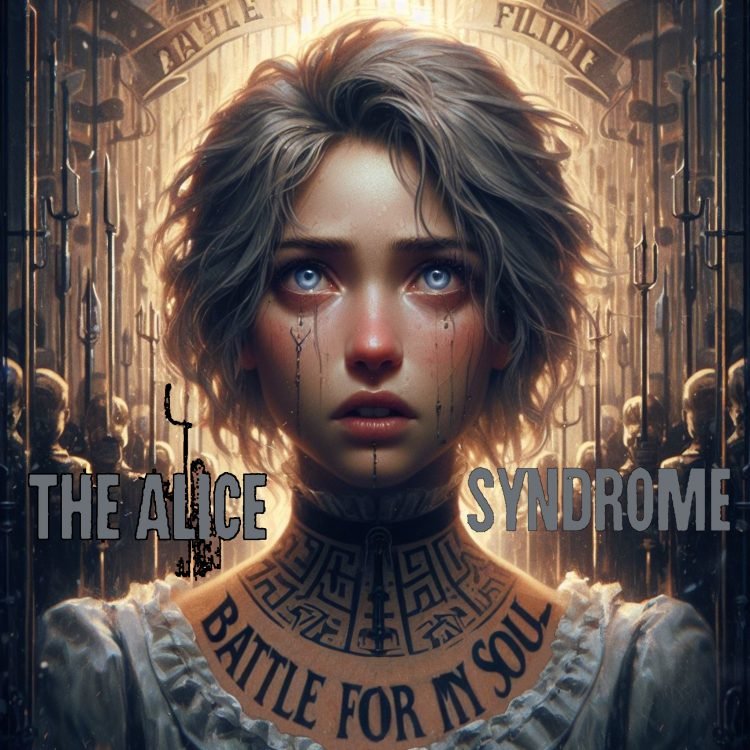
Welcome to George’s blog. I play keyboards in the Alice Syndrome, and I’m also very interested in psychology, spirituality and self-transcendence. Groovhead tends to write all our lyrics, which always touch on subjects that hit deep into my interests.

Lyrics But I will resist in any way I can I will not comply I will not comply Repeats…..
There’s a battle raging in my soul
there are those who would wish to lead me
to satisfy their own agenda’s and aims
To the point where my existence
Becomes an act of resistance
I want you to reassure me
I want you to reassure me
The song, Battle for my soul revisited !!, is a powerful expression of the individual’s struggle against external forces that try to manipulate and control them. The lyrics suggest that the singer is facing a conflict between their own desires and values, and those of others who have different agendas and aims, and exercise control over them. The song declares that these influences will be resisted, even if it means that very existence becomes a form of defiance. The chorus repeats the phrase “I will not comply”, which shows a determination to remain true to self, and also the need for reassurance from others, who can provide understanding and support.
The song can be interpreted as a commentary on the social and political issues of our time, such as the rise of authoritarianism, censorship, propaganda, and surveillance. It proposes that personal freedom and identity are threatened by these forces, and that we have to fight for their rights and dignity.

The song also reflects a common theme in rock music, which is the rebellion against conformity and oppression. Some examples of songs with similar themes are “The Sound of Silence” by Simon and Garfunkel, “Another Brick in the Wall” by Pink Floyd, “Killing in the Name” by Rage Against the Machine, and “Uprising” by Muse.
The world of psychology recognises that often external pressures can cause us to deny and disconnect with our true selves in favour of conforming to the needs of others to feel loved or accepted. This disparity between one’s true thoughts and actions, and the failure to express them, or accept that they are true, is called a lack of self-congruence.
One of the psychological theories that deals with the aspect of human nature related to self-congruence is Carl Rogers’ humanistic theory. According to Rogers, self-congruence is the degree of alignment between one’s self-image, ideal self, and actual experience (Stevenson, 2022). When a person’s self-concept is congruent, they feel authentic and satisfied with themselves. When a person’s self-concept is incongruent, they feel dissatisfied, unhappy, and even mentally ill (Rogers, 1959).
Rogers’ theory of self-congruence assumes that humans have an innate tendency to grow and actualize their potential, which he called the actualizing tendency. However, this tendency can be hindered by external or internal factors that create a gap between the person’s self-image (how they see themselves), ideal self (how they want to be), and actual experience (how they really are). This gap is called incongruence, and it causes psychological distress and maladjustment (Rogers, 1961).
One of the factors that can contribute to incongruence is the presence of conditions of worth, which are expectations or standards that others impose on the person, or that the person internalizes from others, regarding their value or worthiness. For example, a person may believe that they are only worthy of love and acceptance if they achieve certain goals, behave in certain ways, or conform to certain norms. These conditions of worth can conflict with the person’s true feelings, needs, or desires, and thus create incongruence between their self-image and their actual experience (Rogers, 1959).
Another factor that can affect congruence is the degree of unconditional positive regard that the person receives from others, especially significant others such as parents, teachers, or friends. Unconditional positive regard is the acceptance and appreciation of the person as they are, without any judgment or evaluation. When a person receives unconditional positive regard, they are more likely to develop a positive and realistic self-image, and to align their ideal self with their actualizing tendency. When a person receives conditional positive regard, which is based on meeting certain conditions of worth, they are more likely to develop a negative and distorted self-image, and to adopt an ideal self that is incongruent with their actualizing tendency (Rogers, 1961).
Therefore, according to Rogers’ theory, congruence is essential for psychological well-being and optimal functioning. Congruence allows the person to be true to themselves, to express their feelings and thoughts honestly, to pursue their interests and goals freely, and to relate to others authentically. Congruence also facilitates self-actualization, which is the realization of one’s full potential as a human being (Rogers, 1959).
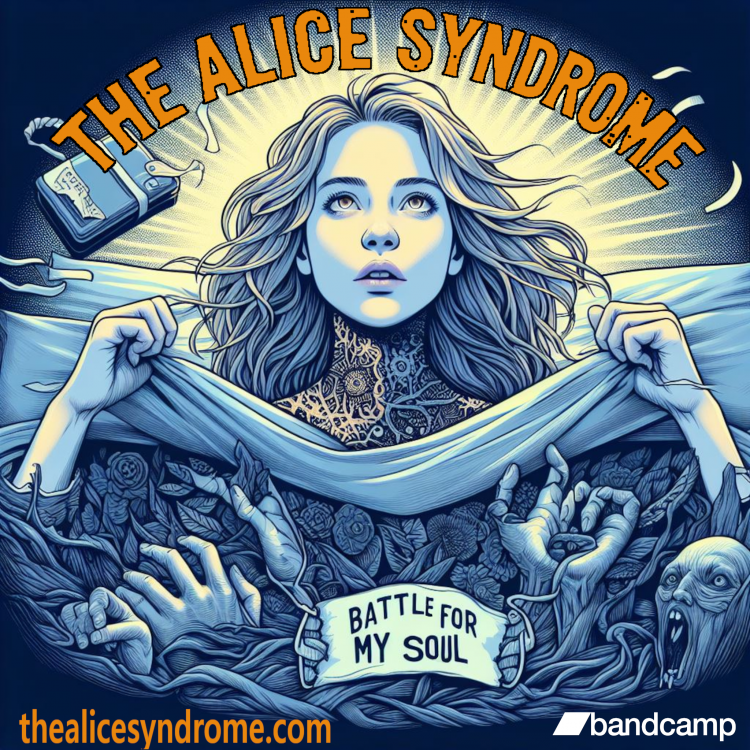
However, achieving congruence can be very challenging for someone who has low self-esteem and confidence, and who faces strong societal pressures to conform or fit in. Such a person may have a negative self-image that does not reflect their true abilities or qualities. They may also have an unrealistic or idealized ideal self that does not match their actual experience or potential. They may feel that they have to hide or change their true selves to be accepted and loved by others. Furthermore, they may experience anxiety, guilt, shame, or anger when they perceive a discrepancy between their self-image, ideal self, and actual experience. They may also resort to various defence mechanisms such as denial, rationalization, projection, or repression to cope with their incongruence (Rogers, 1961).
For example, a person who has low self-esteem and confidence may believe that they are not smart enough, attractive enough, or successful enough to be worthy of respect or admiration. They may also have an ideal self that is based on unrealistic or external standards of beauty, intelligence, or achievement. They may feel pressured by their family, peers, or society to conform to these standards to gain approval or recognition. Furthermore, they may try to hide their perceived flaws or shortcomings by wearing masks or playing roles that are inconsistent with their true-selves. They may also avoid situations or activities that challenge their self-image or expose their incongruence.

Rogers’ theory can be related to the song “Creep” by Radiohead, which expresses the feelings of an outsider who does not fit in with the society’s expectations and norms. The lyrics of the song suggest that the speaker has a low self-image and a high ideal self that they cannot attain. They feel alienated and unworthy of love from the person they admire. He also feels guilty and ashamed of his own existence, as he says, “I don’t belong here” and “I wish I was special”. These are signs of a severe incongruence between his self-image and his ideal self, which leads to a lack of self-esteem and self-acceptance.
Low self-esteem and self-confidence, in my opinion, comes from a lack of wholeness; a lack of inner connection. Meaning the individual concerned will be less self-informed, they will tend to look externally for reassurance, which makes it extremely hard for them not to continue conforming, even though, as Rogers theory suggests, they are likely to feel extremely uncomfortable about the situation, to the point of mental illness. The act of rebellion suggested in this song, is the act of becoming true to self, it is the first stage in the journey of self-actualisation.
References
Rogers, C. (1959). A theory of therapy, personality and interpersonal relationships as developed in the client-centered framework. In S. Koch (Ed.), Psychology: A study of a science. Vol. 3: Formulations of the person and the social context (pp. 184-256). New York: McGraw Hill.
Stevenson, C. (2022). Congruence (Psychology): Definition & Examples (2022). Helpful Professor. Retrieved from https://helpfulprofessor.com/congruence-psychology/
Simon, P., & Garfunkel, A. (1964). The Sound of Silence [Song]. On Wednesday Morning, 3 A.M. Columbia Records.
Waters, R., Gilmour, D., Wright, R., & Mason, N. (1979). Another Brick in the Wall [Song]. On The Wall. Harvest Records.
Morello, T., Commerford, T., Wilk, B., & de la Rocha, Z. (1992). Killing in the Name [Song]. On Rage Against the Machine. Epic Records.
Bellamy, M., Howard, D., & Wolstenholme, C. (2009). Uprising [Song]. On The Resistance. Warner Bros. Records.
Jan 16
George’s Blog: Battle Revisited !!
Welcome to George’s blog about The Alice Syndrome track Battle for my soul revisited !!.
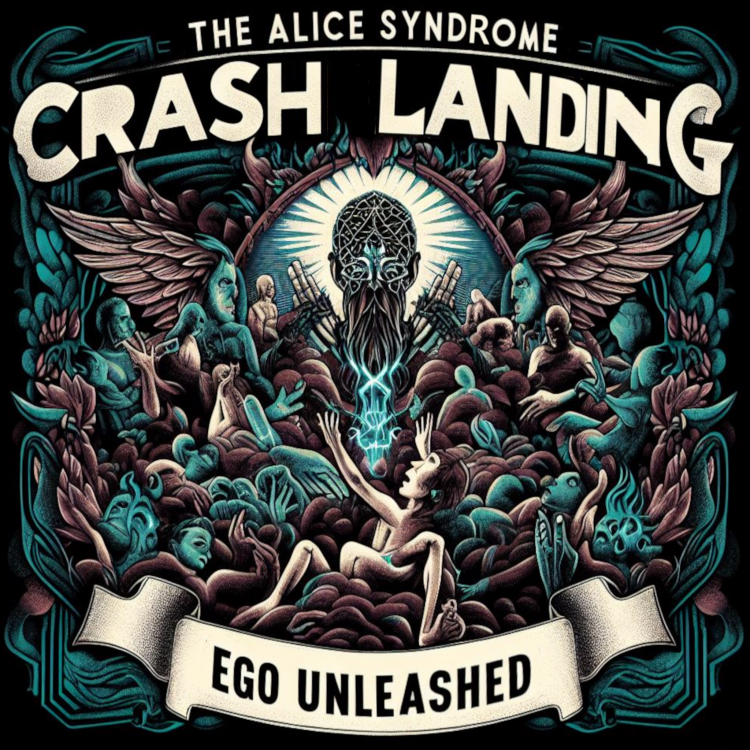
This is the resources page for The Alice Syndrome track Crash Landing.

Buy Download Merchandise Potential triggers
Lyrics We are nothing more than vibrational frequencies We are nothing more than vibrational frequencies We are the distracted We are nothing more than vibrational frequencies We are the distracted We are godhead, denied Unrealised, potential Conditioned We are so close, but not quite there We are the distracted We are potential We are the distracted We are godhead, denied We are so close, but not quite there Conditioned Unrealised, potential We are so close, but not quite there We are the distracted We are so close, but not quite there We are nothing more than vibrational frequencies
It was in my head…
Held captive by physical form
We are potential, unrealised
We are potential, distracted
We are potential, corrupted
But we are, potential
Held captive by physical form
We are potential, unrealised
We are potential, distracted
We are potential, corrupted
But we are, potential
We are the conditioned
We are the controlled
We are the led
But we are, potential
Held captive by physical form
We are potential, unrealised
We are potential, distracted
We are potential, corrupted
But we are, potential
We are the conditioned
We are the controlled
We are the led
But we are, potential
We are petty, we are cruel
We are ego unleashed
We are petty
We are cruel
We are ego unleashed
We are spoilt children
But we are, potential
Unrealised, potential
Unrealised, potential
Unrealised, potential
Distracted
Corrupted
Controlled
Held back by our inherent flaws
But we are, potential
We are the conditioned
We are the controlled
We are the led
But we are, potential
We are potential, corrupted
But we are, potential
We are the conditioned
We are the controlled
We are the led
But we are, potential
We are petty, we are cruel
We are ego unleashed
We are petty
We are cruel
We are ego unleashed
We are spoilt children
But we are, potential
Held back by our inherent flaws
But we are, potential
Distracted
Corrupted
Controlled
But we are, potential
Conditioned
Distracted
Corrupted
Controlled
Held back by our inherent flaws
But we are, potential
We are the conditioned
We are the controlled
We are the led
But we are, potential
Held back by our inherent flaws
But we are, potential
Held captive by physical form
We are potential, unrealised

Jan 15
Crash landing – Resources

Welcome to George’s blog. I play keyboards in the Alice Syndrome, and I’m also very interested in psychology, spirituality and self-transcendence. Groovhead tends to write all our lyrics, which always touch on subjects that hit deep into my interests.
Stop me but give me more – Bandcamp
Stop me but give me more, is a song about hearing voices. I love it because of this. 17 years ago, I started hearing voices. That was the beginning of quite a journey. Happy is the man who loves his voices.
Hearing voices is a common phenomenon that occurs in different cultures and contexts. However, many people are afraid of admitting that they hear voices because they think it is a sign of insanity, especially schizophrenia. This makes it a taboo topic that is rarely explored in the media or other forms of expression. One of the challenges is that hearing voices is not well understood, and people tend to avoid talking about it.
One of the songs that addresses hearing voices is Hearing Voices by Suicidal Tendencies, a band that pioneered the fusion of hardcore punk and metal in their 1983 debut album. The song depicts the experience of a person who has schizophrenia and hears voices that urge him to commit violent acts. The song has a fast pace, harsh vocals, and heavy guitars that convey the intensity and distress of the voice hearer. (Suicidal Tendencies, 1983)

Hearing voices, also known as auditory verbal hallucinations, is a phenomenon that can occur in various contexts and is not necessarily a sign of mental illness (Mind, n.d.). In fact, many psychologists are proposing ideas about human multiplicities, which suggest that we all have different parts or sub-personalities within us that may express themselves in different ways (Good Therapy, 2021). One of these ways may be through hearing voices that represent different aspects of ourselves, such as our inner critic, our inner child, our protector or our guide. These voices may have different origins, such as trauma, stress, bereavement, spiritual experiences, effects of psychedelics, or physical factors (Mind, n.d.).
Some therapies, such as Internal Family Systems (IFS) therapy, offer great hope of enabling the individual to reintegrate negative voices in a positive and supporting way. IFS is based on an integrative model that combines elements from different schools of psychology and posits that each part possesses its own characteristics and perceptions (Good Therapy, 2021). IFS therapy aims to help the individual access their core self, which is the source of healing and compassion, and to establish a harmonious relationship with their parts. By doing so, the individual can reduce their distress and increase their wellbeing (Good Therapy, 2021).
My personal journey with my voices has been transformative and empowering. I used to be tormented by them, as they constantly threatened to end my life. However, I discovered a way to work with them, rather than against them, by applying a technique inspired by Jungian shadow work.
According to Jung (1958), the shadow is the repressed part of ourselves that we find unpleasant or intolerable. It contains both negative and positive aspects, but we tend to label them as all bad and try to avoid them. Shadow work is the process of acknowledging and integrating the shadow so that we can become more whole and authentic (Bertholo, 2013). By doing shadow work, I was able to understand the origin and purpose of my voices, and to communicate with them in a respectful and compassionate way.
I realized that they were not my enemies, but parts of myself that needed healing and acceptance. I invited them to join me in creating an inner support network, where we could help each other grow and thrive. To my surprise, even the most hostile and demonic voices agreed to drop their negativity and become part of my team. Nowadays, I no longer fear or hate my voices. They are my inner allies, who offer me guidance, encouragement, and wisdom. I want to share this message of hope with anyone who struggles with their voices: You are not alone, and you can transform your relationship with them.
References
Bértholo, Joana. (2013). The Shadow in Project Management. Procedia – Social and Behavioral Sciences. 74. 358–368. 10.1016/j.sbspro.2013.03.007.
Cleveland Clinic. (2020). Auditory Hallucinations: Causes, Symptoms & Treatment. https://my.clevelandclinic.org/health/symptoms/23233-auditory-hallucinations
Good Therapy. (2021). Internal Family Systems Therapy. https://www.goodtherapy.org/learn-about-therapy/types/internal-family-systems-therapy
Jung, C. G. (1958). The undiscovered self. Little, Brown.
Mental Health Foundation. (n.d.). Hearing voices. https://www.mentalhealth.org.uk/england/explore-mental-health/a-z-topics/hearing-voices
Mind. (n.d.). Hearing voices. https://www.mind.org.uk/information-support/types-of-mental-health-problems/hearing-voices/about-hearing-voices/
Suicidal Tendencies. (1983). Hearing Voices. On Suicidal Tendencies [Album]. Frontier Records.
Jan 15
George’s Blog: Stop me but give me more
George’s Blog: Stop me but give me more, is a song about hearing voices. I love it because of this. 17 years ago, I started hearing voices. That was the beginning of quite a journey. Happy is the man who loves his voices.
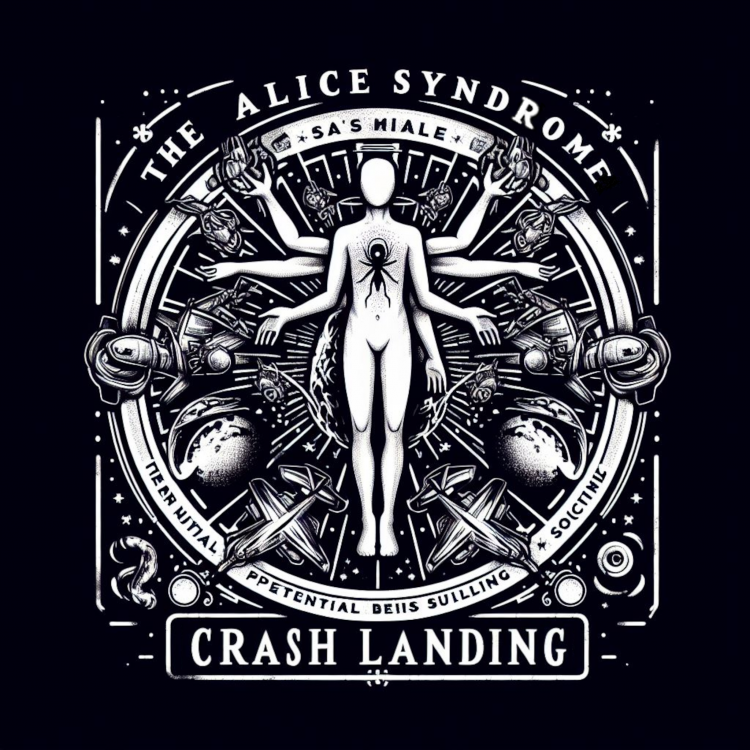
Welcome to George’s blog. I play keyboards in the Alice Syndrome, and I’m also very interested in psychology, spirituality and self-transcendence. Groovhead tends to write all our lyrics, which always touch on subjects that hit deep into my interests.

Crash landing is a song that explores the theme of human potential and its limitations. The lyrics of the song reflect our influences by philosophical and psychological concepts such as existentialism, and transhumanism. The lyrics of Crash landing reflect a sense of alienation and dissatisfaction with the human condition.
The song begins with the lines:
We are nothing more than vibrational frequencies
Held captive by physical form
We are potential, unrealised
We are potential, distracted
We are potential, corrupted
But we are, potential
These lines suggest that we view human beings as essentially spiritual or energetic beings that are trapped in material bodies that limit their possibilities. The repetition of the word “potential” implies that humans have the capacity to transcend their physical limitations and achieve a higher state of existence, but they are hindered by various factors such as distraction, corruption, or conditioning. We also express a sense of frustration and despair with the current state of humanity, as it describes humans as:
We are godhead, denied
We are petty, we are cruel
We are ego unleashed
We are petty
We are cruel
We are ego unleashed
We are spoilt children
These lines contrast the idea of human potential with human reality, showing how humans fail to live up to their divine nature and instead act selfishly, violently, and immaturely. The phrase “ego unleashed” suggests that humans are driven by their lower instincts and impulses, rather than their higher aspirations and values. The song also criticizes the social and political systems that control and manipulate humans, as it states:
We are the distracted
We are the conditioned
We are the controlled
We are the led
These lines imply that humans are not free to pursue their true potential, but rather are subjected to various forms of indoctrination, propaganda, and coercion that keep them in a state of ignorance and conformity.

The song also expresses a sense of urgency and hope for change, as it repeats:
Unrealised, potential
Unrealised, potential
Unrealised, potential
Unrealised, potential
These lines emphasize the gap between what humans are and what they could be, as well as the possibility of closing that gap if humans awaken to their true nature and purpose. The song ends with the lines:
We are so close, but not quite there
Held back by our inherent flaws
But we are, potential
These lines suggest that despite all the obstacles and challenges that humans face, they still have a chance to overcome them and reach their full potential. However, they also acknowledge that humans have inherent flaws that make this task difficult and uncertain.
The theme of human potential and its limitations is not unique to The Alice Syndrome. Many other musicians and philosophers have explored this topic in different ways. For example:
Pink Floyd’s album The Wall (1979) depicts the psychological breakdown of a rock star who isolates himself from society and builds a metaphorical wall around himself to cope with his trauma and alienation. The album criticizes the oppressive forces that shape human behaviour and identity, such as war, education, religion, the media, and consumerism.
Jean-Paul Sartre’s existentialist philosophy argues that humans are free to create their own meaning and values in a world that is absurd and devoid of inherent purpose. However, this freedom also entails responsibility and anxiety, as humans have to face the consequences of their choices and actions.
Ray Kurzweil’s transhumanist vision proposes that humans can enhance their physical and mental capacities through technology and artificial intelligence. He predicts that humans will eventually merge with machines and achieve a state of singularity where they will transcend their biological limitations.

Jan 15
George’s Blog: Crash landing
This edition of George’s Blog discusses The Alice Syndrome trach Crash landing, which claims human potential is being stifled.

https://www.youtube.com/watch?v=Tnh8GwSuZQI
This is the resources page for The Alice Syndrome’s track Battle for my soul revisited !! This is the second time we have looked at this track, it may not be the last….
Download Merchandise George's Blog Potential triggers
Lyrics There’s a battle raging in my soul But I will resist in any way I can I will not comply I will not comply Repeats…..
Jan
14
This is the resources page for The Alice Syndrome’s track Battle for my soul revisited !! This is the second time we have looked at this track, it may not be the last…. This is the resource page for The Alice Syndromes audio track and video, Full spectrum domination. Download Merchandise Resources George's Blog Potential triggers
Jan
12
This is the resource page for The Alice Syndromes audio track and video, Full spectrum domination Welcome to George’s blog. I play keyboards in the Alice Syndrome, and I’m also very interested in psychology, spirituality and self-transcendence. Groovhead tends to write all our lyrics, which always touch on subjects that hit deep into my interests. The following is a statement from Groovhead: “,,,,,full spectrum domination was written in response to the the insidious , and seemingly inevitable rise of fascist right wing extremist ideologies that , inch by inch are begining to insinuate themselves across the globe , and impact on every aspect of our existence , no better exemplified by the rise in popularity of the poster boy of modern fascism donald trump ,and his surreal appointment to the presidency of the united states ,,,,,the term fsdis a tool by which control is exerted from the earliest of ages so that the idealogies of the far right are absorbed and become engrained in the individual so that they know no other ways of thinking ,,,,think of north korea but with better hair cuts , this can be seen in the usa with the power of right wing christian fundamentalists deciding what can m or cannot be taught in schools , books being banned in libraries , to the teaching of jewish children to hate palestinians from the earliest of ages , all sanctioned and encouraged by thier respective governments .trump was the ideal choice to illustrate this , as he has made no secrets of his desire to control through an authroitarian regime , his marginalistation and demonisation of certain groups ,and his many close links to several hardcore right wing groups , his popularist rhetoric playing on the weaknesses , fears and prejudices of his hardcore maga followers ,even going so far as to quote from mein kampf ,,sort of gives a clue to what lies beneath .Despite the song being specifically about trump , the song uses him as an example of our gradual slip towards a more authoritarian right wing existence , where compliance is all , and the ‘others ‘are vilified and scapegoated , where the erosion of freedom is the norm , and our seeming inability and impotence or apathy to do anything about it ,,,,we , in the alice syndrome , are proud to be part of the ‘others ‘ ,,,,no comply , groovhead” Our track full spectrum domination is a dark and dystopian song that explores the themes of power, control and resistance. It’s really an anthem for resistance, a song which promotes the rights of the individual against the rights of the state. The video is a collage of images and clips that depict scenes of resistance to oppression and surveillance, such as protests and rebellion, over a soundscape that showcases Trumps “build the wall” period, while refrains of the star-spangled banner drift in the background. It also highlights the beauty of nature, and raises concerns about the immorality of globalist capitalism. We use audio samples of Donald Trump and the USA anthem in the track to create a dystopian and satirical critique of American imperialism and militarism. The track combines a determined beat with distorted guitar riffs, synth electro sounds, deep bass, and vocal samples from Donald Trump’s speeches and interviews from the time of “Who’s going to build the wall”, to parody the political system in general. The track begins with the USA anthem played in a distorted and dissonant way, followed by Trump’s voice saying “We will build the wall”. The track then alternates between segments of Trump’s voice and segments of other political commentators, who imply Trump is insane. We try to get the message across that this is a sideshow, that we never get to see what’s really going on. The use of trump audio and the USA anthem in this track can be interpreted as a form of political parody and protest music, which aims to expose and ridicule the contradictions and absurdities of Trump’s rhetoric and policies. We try to use humour to challenge Trump’s discourse of nationalism, jingoism, and political machoism, Full spectrum dominance is a term used by the US Department of Defence to describe its military strategy of achieving control over all domains of warfare, including land, sea, air, space, and cyberspace (US Department of Defence, 2001). We use this title to provide a comparison in terms of each of the political factions desire to have total control to that of the global militarist proposition of full spectrum dominance. We are trying to show that we are not only being lied to, but we are being encouraged to be divisive, and ultimately hate others. The Alice Syndrome often uses musical sampling in our tracks, which is “the act of taking a portion of one sound recording and reusing it as an instrument or element of a new recording” (McLeod & DiCola, 2011, p. 1). We use sampling as a creative and expressive technique to create new meanings and associations from existing sounds. By sampling Trump’s voice and the USA anthem, we transform them into musical instruments that convey our political message. This also creates a contrast between the original meanings and contexts of these sounds and the new ones that we create. For example, by distorting the USA anthem, we subvert its patriotic and celebratory meaning into a dystopian and ironic one. By juxtaposing Trump’s voice with other commentators, we create a dialogue that exposes the ludicrous extremes that politicians and political activists get up to everywhere. Full Spectrum Domination is a powerful and provocative piece of music that challenges the listeners to think critically about the issues of human rights, political power, social control and manipulation, and resistance in the contemporary world. The track uses a combination of sonic and visual elements to create a unique and compelling aesthetic experience that conveys a message of dissent and opposition to the oppressive practices of political full spectrum domination. The track is a form of artistic expression and social commentary that engages with the political and ethical dimensions of human existence. McLeod, K., & DiCola, P. (2011). Creative license: The law and culture of digital sampling. Duke University Press. Street, J. (2012). Music and politics. Polity Press. US Department of Defense. (2001). Joint vision 2020: America’s military: Preparing for tomorrow. https://www.hsdl.org/?view&did=4395
Jan
12
George’s Blog on The Alice Syndrome website. This time, I’m looking at our track full spectrum domination and describing what it means to me. This is the resources page for The Alice Syndrome track Haiku Priestess Download Merchandise George's Blog Potential triggers Lyrics Giant stars collapsed Giant stars collapsed A duality, substance, power The weight of the words lands gently Hurt buried deep to avoid the unbearable Fear and confusion Fear and confusion Slime, seething with spite Unexpected hurt floods system Trinkets of status Trinkets of status The weight of the words lands gently Fear and confusion Fear and confusion Slime, seething with spite Unexpected hurt floods system Trinkets of status Trinkets of status The weight of the words lands gently Fear and confusion Fear and confusion Slime, seething with spite Unexpected hurt floods system Trinkets of status Trinkets of status The lyrics to Haiku Priestess, are a complex and poetic expression of emotions and experiences. The song is divided into four sections, each consisting of three haikus, followed by a chorus that repeats the same four lines. The haikus follow the traditional 5-7-5 syllable pattern, but they also rhyme, creating a musical and rhythmic effect. The first section describes the cosmic origin of existence, using metaphors of giant stars, whirling ghosts, and ripples in time and space. This singer suggests that they are a product of a duality, a substance and a power that are imbalanced and opposite. This sets the stage for the contrast and conflict that will be explored in the rest of the song. The second section focuses on the inner world, describing experiences of a range of emotions and sensations that are overwhelming and sometimes contradictory. Words such as hurt, fear, confusion, pain, pleasure, sensory overload, and shutdown are used to convey intense feelings. The chorus repeats the phrase “the weight of the words lands gently with great impact”, implying an awareness of the power and significance of expression, but that it can also be softened or moderated. The third section shifts to the outer world, where the challenges and threats from others who do not understand or appreciate are explored. There is use of the imagery of slime, spite, tormentors, bleaching, wounds, brash, and rash to enemies and their actions. The song also contrasts values with those of the mainstream society, rejecting trinkets of status and conventional worth. The fourth section repeats the same haikus as the first section. This creates a sense of closure and circularity, but also a subtle change in tone and emphasis. The song is a powerful and creative example of using haiku as a form of lyrical expression. It manages to convey a lot of information and emotion in a concise and structured way, while also creating a musical and poetic effect.
Jan
12
This is the harder faster quicker now resources page. Download George's Blog Potential triggers Lyrics There are too many books I have not read
there are those who would wish to lead me
to satisfy their own agenda’s and aims
To the point where my existence
Becomes an act of resistance
I want you to reassure me
I want you to reassure me
Battle for my soul revisited – Resources


Full spectrum domination – Resources
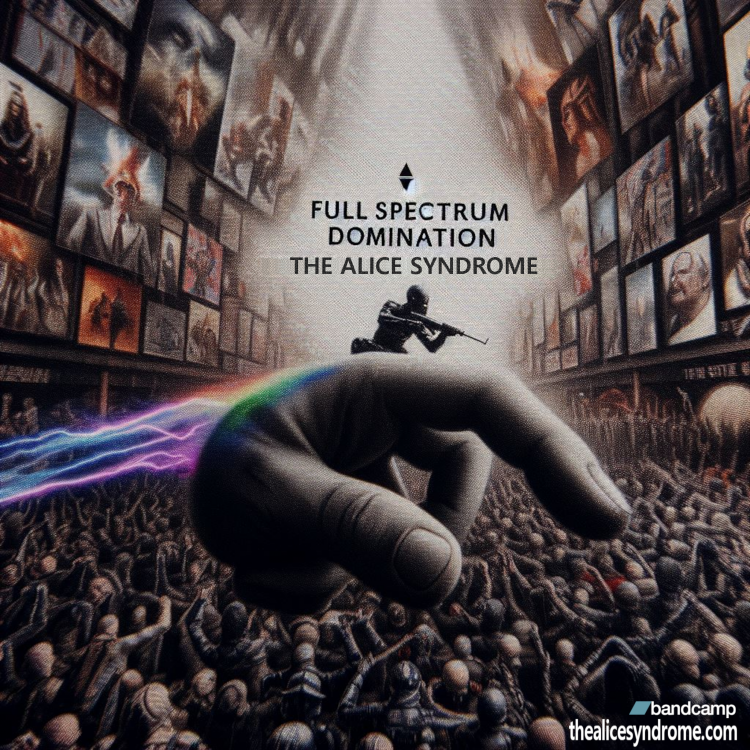

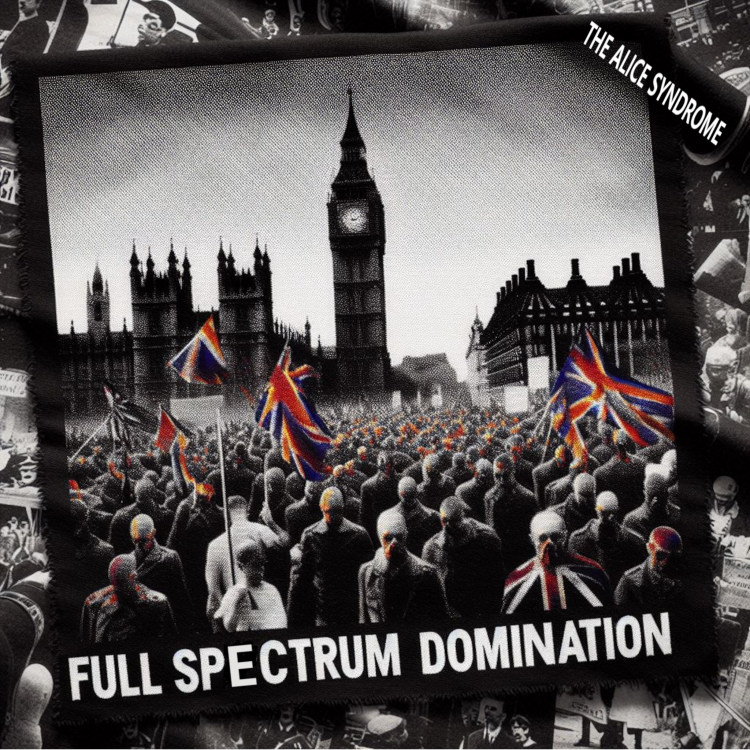
References
George’s Blog: Full spectrum domination


Whirling ghosts merged and shuddered
Rippling through time and space
Whirling ghosts merged and shuddered
Rippling through time and space
Imbalance, equal opposite, opposite
With great impact
Part of the process
Unearthing sheds light
Pain and pleasure
Sensory overload
Shutdown
Pain and pleasure
Sensory overload
shutdown
Tormentors lurk in the depths
Bleaching out the joy
Wounds opened by the brash
And the rash
Conventional worth
Value, dismissed by design
Conventional worth
Value, dismissed by design
With great impact
Part of the process
Pain and pleasure
Sensory overload
shutdown
Pain and pleasure
Sensory overload
shutdown
Tormentors lurk in the depths
Bleaching out the joy
Wounds opened by the brash
And the rash
Conventional worth
Value, dismissed by design
Conventional worth
Value, dismissed by design
With great impact
Part of the process
Pain and pleasure
Sensory overload
shutdown
Pain and pleasure
Sensory overload
shutdown
Tormentors lurk in the depths
Bleaching out the joy
Wounds opened by the brash
And the rash
Conventional worth
Value, dismissed by design
Conventional worth
Value, dismissed by design
Haiku priestess – Resources


too many words I have not said
Too many feelings left untouched
Harder faster quicker now
Lessons learnt will be forgotten
As I plot another process
plot another path of torment
harder faster quicker now
Lessons learnt will be forgotten
As I plot another process
plot another path of torment
harder faster quicker now
Take the knife and mark my skin
As my soul is spread so thin
Drain me slowly, take it all
Harder faster quicker now
Lessons learnt will be forgotten
As I plot another process
plot another path of torment
harder faster quicker now
Take the knife and mark my skin
As my soul is spread so thin
Drain me slowly, take it all
Harder faster quicker now
Lessons learnt will be forgotten
As I plot another process
plot another path of torment
harder faster quicker now
Take the knife and mark my skin
As my soul is spread so thin
Drain me slowly, take it all
Harder faster quicker now
Warning signs will go unnoticed
As I work on through the process
Choosing not to see the dangers
Harder faster quicker now
Lessons learnt will be forgotten
As I plot another process
plot another path of torment
harder faster quicker now
Take the knife and mark my skin
As my soul is spread so thin
Drain me slowly, take it all
Harder faster quicker now
There are too many books I have not read
too many words I have not said
Too many feelings left untouched
Harder faster quicker now
Lessons learnt will be forgotten
As I plot another process
plot another path of torment
harder faster quicker now
I want more days so I have time
To reclaim what is rightfully mine
Though it never can be returned
Harder faster quicker now















